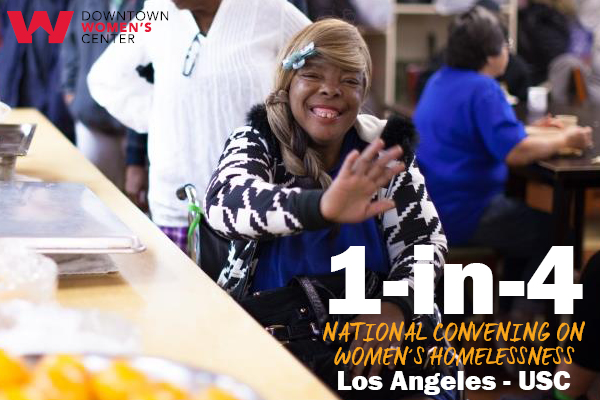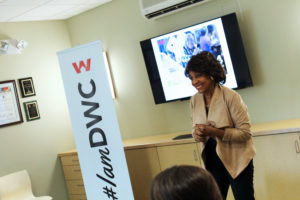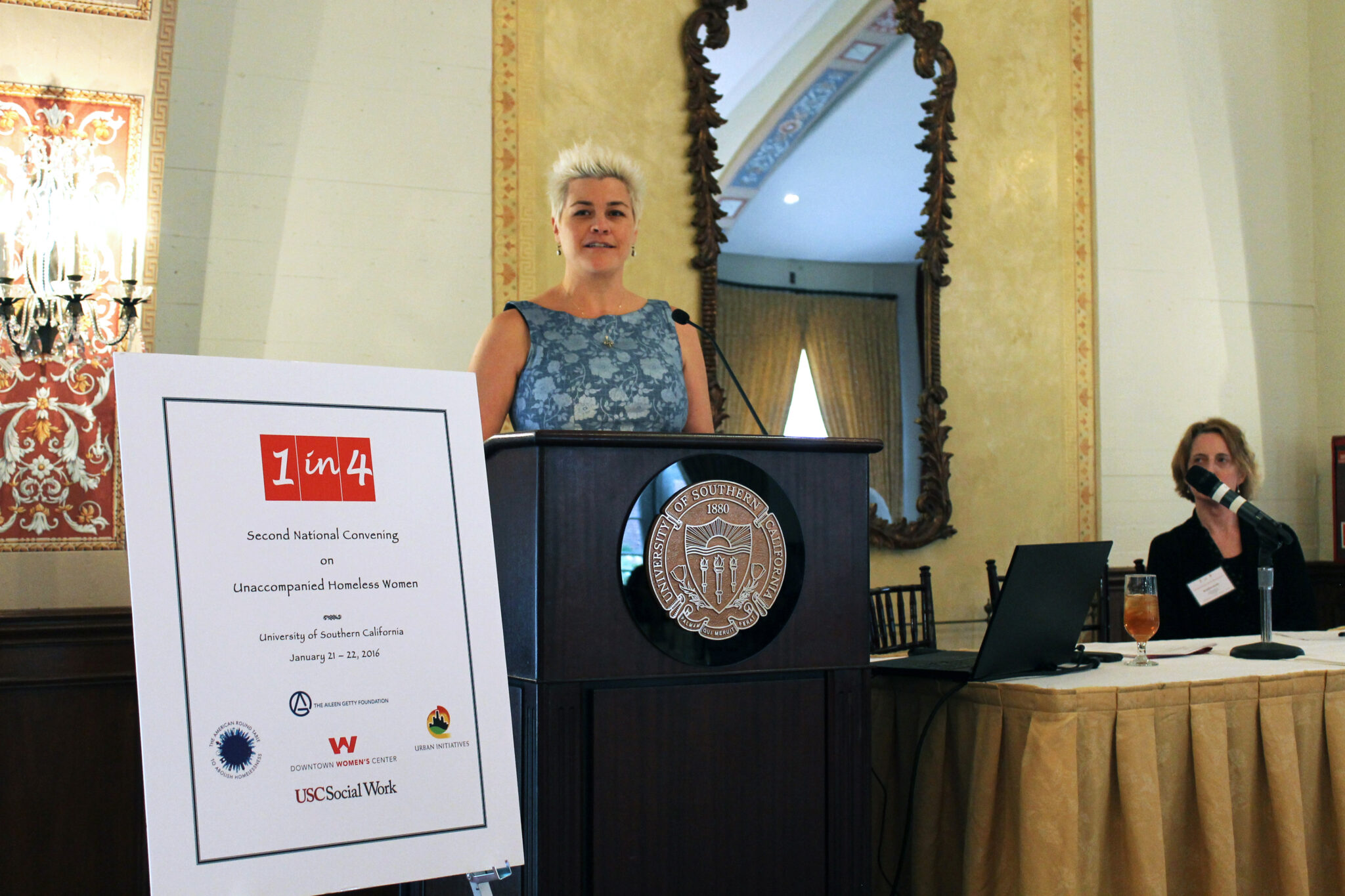Did you know that 1-in-4 homeless adults is an unaccompanied woman?
Together, the Downtown Women’s Center and partners across the country are changing that.
We recently had the pleasure of joining with the American Round Table to Abolish Homelessness to co-host “1-in-4, the Second National Convening on Unaccompanied Homeless Women,” in partnership with the Aileen Getty Foundation, Urban Initiatives, and the USC School of Social Work.
The convening brought together over 100 researchers, practitioners, policymakers, and advocates from across the county committed to ending women’s homelessness.
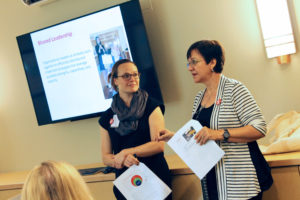
We kicked off the two days with an intimate gathering of representatives from the offices of Mayor Eric Garcetti, Senator Holly Mitchell, Supervisor Mark Ridley-Thomas, and Councilmember José Huizar. All spoke passionately about ending homelessness, as did District Attorney Jackie Lacey and Congresswoman Maxine Waters, who gave rousing presentations on the need for political will and resources directed toward mental health and housing.
.@LADAOffice‘s Jackie Lacey: “We have neglected and ignored this problem for far too long.” #1in4LA pic.twitter.com/QPPc3Ui3nj
— DowntownWomensCenter (@DWCweb) January 21, 2016
Convening participants took part in a morning session at DWC, learning from staff about the organization’s programs and best practice models, and hearing from community advocates Amiyoko of DWC’s Participant and Advisory Board, and Dorothy Edwards, Board Member of the Corporation for Supportive Housing (CSH), interviewed by CSH’s Ann English.
RESEARCH
Data gaps on homelessness among women: social network, employment, family, housing, targeted solutions. We need research! #1in4LA
— Molly Moen (@mollyrmoen) January 21, 2016
Central to the 1-in-4 movement is the belief that unaccompanied homeless women (meaning women that are not accompanied by children or family members) must be recognized as a specific population deserving of unique resources and services. To start, we need more data on homeless women in order to better meet their needs and, in the long run, prevent and end homelessness.
Mary Ellen Hombs presented an essential literature review of national data on unaccompanied women (to be released this spring), while Dr. Sofia Herrera of Urban Initiatives shared extensive Point-in-Time data on unaccompanied women in San Bernardino County. Kim Albers of Flood Bakersfield Ministries shared her organization’s practical approach to using regional data to drive outreach and program design.

BEST PRACTICES
The convening was an opportunity for experts to share the models that have been most successful in ending homelessness. Among the discussion of best practices in the field, such as the widely-recognized models of Housing–First and Permanent Supportive Housing, Rev. Christina Rathbone of Cathedral Church of St. Paul, Boston beautifully introduced the concept of “Sense of Belonging.”
Rev. Cristina Rathbone: “Not every house is a home, not every home is a house.” #1in4LA pic.twitter.com/2VCRZ4GiC3
— DowntownWomensCenter (@DWCweb) January 21, 2016
Drs. Herrera and Wenzel introduced their continuing research on what “Sense of Belonging” means in particular for unaccompanied women, sharing key indicators in measuring sense of belonging and new findings on women’s life goals before and after entering Permanent Supportive Housing.
“We all deserve, as a human right, to thrive.” -Dr. Suzanne Wenzel #1in4LA
— Taylor Harris (@PermanentKittn) January 22, 2016
.@uscsocialwork Top 5 goals among surveyed homeless women: education, health, employment, relationships w. children & giving back. #1in4LA
— DowntownWomensCenter (@DWCweb) January 22, 2016
The experience of trauma as one of the leading causes of homelessness for women came up throughout the convening, with Dr. Elise Riley of the University of California, San Francisco and Brenda Ingram of Peace Over Violence speaking to the importance of Trauma-Informed Care in conducting research and at every level of service delivery:
Mortality rates among homeless women 10 times that of general population – Dr. Elise Riley, UCSF. That’s why our work is important. #1in4LA
— Molly Moen (@mollyrmoen) January 22, 2016
No coincidence that most victimized by violence are most disempowered @OverViolence #1in4LA @Stokes24 pic.twitter.com/FSsAR5yEXe
— Ann English (@csh_ann) January 22, 2016
RESOURCES
Encouraging collaboration is also central to 1-in-4, including sharing of resources and program design. Molly Moen of Chrysalis and Joe Altepeter of DWC detailed how workforce development programs geared towards homeless individuals are critical to forging a path toward stability.
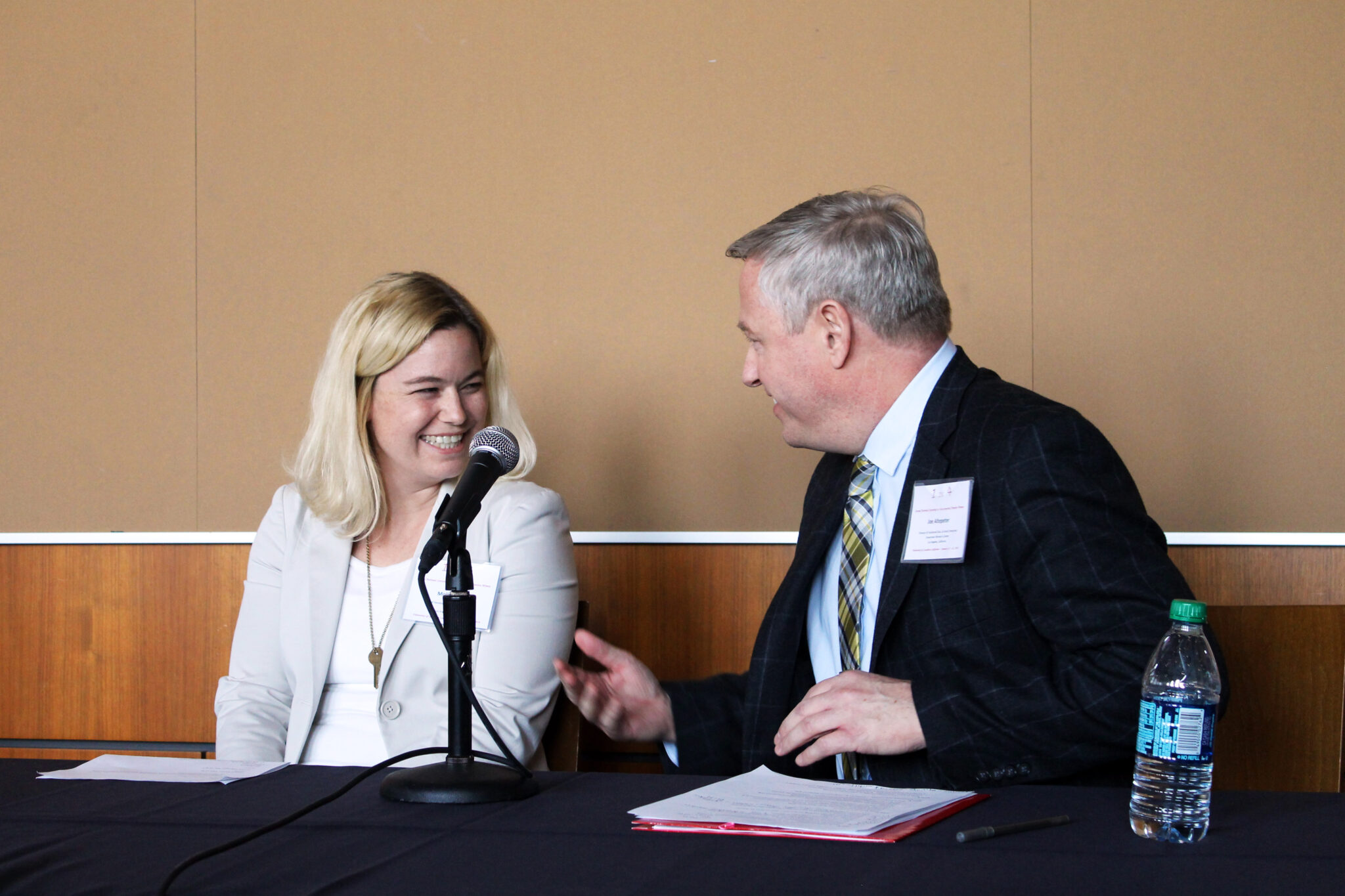
Presenters also explored how the solution of housing can be scaled, with Lisa Watson, former CEO of DWC and currently at the LAPSA Center, Scripps College, Todd Lipka of Step Up in Second, and Kathy Ragner of Sarah’s Circle in Chicago reflecting on their diverse experiences in housing development, including strategies for community consensus-building and long-term planning.
ADVOCACY
Throughout the convening was a spirit of feminism and collective determination to launch a greater movement to end homelessness for women.
Our own Joe A. @MADEbyDWC: “DWC was founded on feminism. If you’re here, there’s a little feminism in you.” #1in4LA pic.twitter.com/NDYnDjPqqz
— DowntownWomensCenter (@DWCweb) January 21, 2016
Speaking of his work with the Canadian Observatory on Homelessness, Stephen Gaetz shared the collective impact model adopted by “A Way Home,” a movement to end youth homelessness, as inspiration for 1-in-4.
The role of government agencies in advocacy was also highlighted, with Amy Sawyer of the Interagency Council on Homelessness and Vince Kane of the VA sharing their commitment to working with service providers to better serve homeless women. Kane recognized the need for specialized services for women, noting that “choice and flexibility” must come first.
Amy Sawyer of US Interagency Council kicks us off: “It’s not if we can end homelessness, but when we can.” #1in4LA pic.twitter.com/6y3CPOzp9J
— DowntownWomensCenter (@DWCweb) January 22, 2016
A rousing talk from Melissa Bird, PhD candidate at USC, urged participants to raise their voices together and take bold steps to build a national movement:
@birdgirl1001 we can change the world by “graceful revolution” founded in punk rock attitude #1in4LA @CSHInfo @DWCweb
— Ann English (@csh_ann) January 22, 2016
Lisa Watson and DWC CEO Anne Miskey brought the convening to a close with calls to action. “Open your mouths to call for change,” shared Anne. “Demand that women’s lives are valued and needs addressed. Together, let us be warriors.”
Housing first YES! Safety first YES! Women first ABSOLUTELY! Move forward as warriors for women! #1in4 #1in4LA pic.twitter.com/3PY1wkZr5r
— Dr. Melissa Bird (@birdgirl1001) January 22, 2016
Thank you to all the participants that travelled far and wide to share resources, solutions, and inspiration. We are at an opportune moment in time to end homelessness for women, and the Downtown Women’s Center is excited for all that comes next for the 1-in-4 movement!
We would like to thank The American Roundtable to Abolish Homelessness; Suzanne Wenzel, Ph.D. with the USC School of Social Work; Sofia Herrera, Ph.D. with the Office for Urban Initiatives; and all of the 1-in-4 participants for their partnership in this vital work. Find more highlights and join the conversation at #1in4LA on Twitter.

